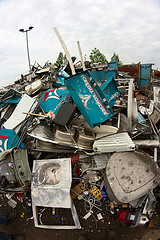For almost two years, we conduct a research on the users of the sites of donations of objects that are donnons.org, recupe.net and the network freecycle[1]. We ask ourselves who are the users of these sites and analyze the purposes and various modalities by which they use them[2].

The recovery of used objects is a practice shared by individuals with different backgrounds various speeches, commitments, and practices differ greatly. The empirical research that we conducted led to recognize the scope ambivalence of this practice : it is for some a way to insert himself into the society of consumption, when it is invested by others with a range opposition. Our object to rest the question of the mobilization of consumers, and there is inscribed at the crossroads of the sociology of consumption and sociology of social movements. The “récup’ “is a form of” consumer engaged “[3], critical, of which the particularity is to express themselves through forms of non-market consumption. Thought of as offering an alternative route to the consumer market, the sites of donations allow actors to point out the limitations of the traditional consumption model and value-to-side potential of the system. By their individual actions of recovery, individuals invite us to rethink the modes of consumption, whether to extend the consumer society, the challenge from the inside or out.
We may think a priori that the reclaimers are exclusively those in need, to whom the donations are to save money to meet other expenses (there are a lot of single-parent families, the unemployed, students, young couples), our survey, which was conducted by participant observation on the Rhône-Alpes region[4], interviews and survey questionnaire, allows us to show that they are not the only users of the sites. We have isolated two dominant logics of use of sites of gifts. We oppose the people who use the sites to gifts as a way to consume more, that we call ” consumers “, to ” recyclers “.
They are “maximisateurs” or “moderate,” consumers use the sites for donations to ” do business “, get items for free and do not value that at the margin the alternative to the model of the consumer that this practice might represent. The “maximisateurs” can be distinguished from other users of the sites of donations by the time that they spend there and the number of donations collected. The excitement and fun of “trying his luck ” for many of the donations[6], manifested by requests to numerous and repeated : even if (or maybe because they have the means, the act of retrieving has a special flavor to their eyes, that of the braconne (De Certeau, 1990), and diversion. Often experts from the sites of recovery, they know how to predict what is in demand, what goes fast and what is not. They chinent sites on the web donations, and develop, in this respect, the techniques to recover the maximum amount of gifts or donations the most interesting.
Conversely, the “recyclers” seek through these sites to fight against waste. They are divided between the “reclaimers” and the ” activists “, who are unevenly protest and/or invested in the cause and ecologist. The “skimmers” are particularly sensitive to the fact of giving a second life to objects discarded, they do not accept the waste product of the consumer society. Practices contestatrices of these people, however, remain practices “contestatrices amateur”, to the extent that even if the “resistance to the system from any dealer ” in the words of a respondent lives on a daily basis, she copes with contradictions, and does not lead to activism.
Conversely, those that we call “activists” are distinguished from skimmers by their commitments from the associations, which take precedence in their social identity. They define themselves willingly as a consumer alternative, which promote the consumption of a ” different idea about society “. The sites of the donations are for them a medium to display their ideals and other collective commitments ; the dimension of social criticism is valued and stimulating. This is for the “recyclers” to make a break with the very idea of consumption by questioning the idea of payment.
[1] Spaces of the relationship between people who wish to get rid of objects with those who ask, these sites are experiencing growth.
[2] An article should soon be published in a collective book published at The Harmattan. We focus here only on the recipients and not on donors.
[3] Sophie Dubuisson-Quellier, The consumption engaged, Presses de Sciences Po, collection ” Challenge “, 2009
[4] We have carried out more than two hundred gifts, and we got a fifty.
[5] The questionnaire circulated on the Internet and built on Limesurvey is currently still being broadcast, we have to this day 1039 full answers to 1268 respondents.
[6] The consumer becomes closer to the’Homo ludens defined by Huizinga J, 1988.
